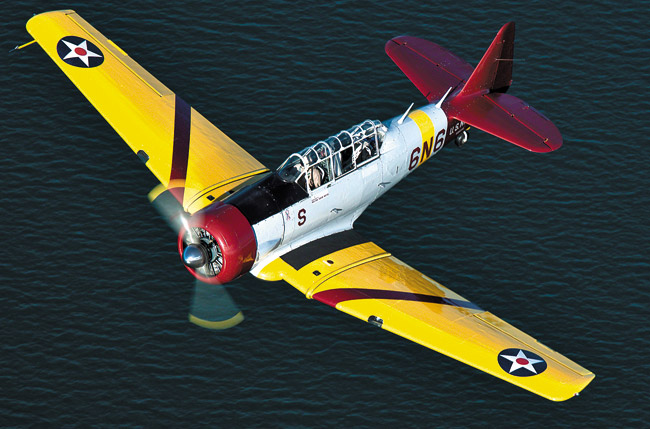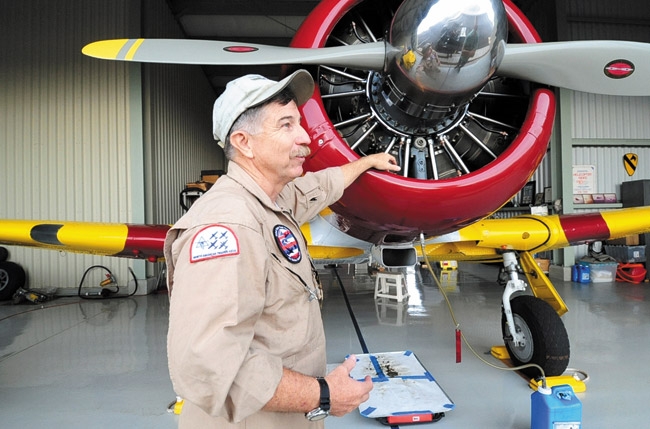A Tour That Relives The Days After Dec. 7
You’re a young Navy ensign, assigned to assess the damage to Oahu military sites in the days after the attack on Pearl Harbor. First comes a classified brief, then a flight in a WWII plane, in Hawaii’s most unique tour
Apparently, time travel is possible. And quite easy. Wormholes or alien technology are not needed to go back 72 years and experience what it may have been like just days after the attack on Pearl Harbor. All you need is a car and a few hours.
mw-nm-120413-airtour-3
Vintage Aviation’s Pearl Harbor Experience is an all-senses history lesson and adventure tour that quite literally brings history to life. The entire tour surrounds the guest with the sights, sounds and even smells of the era.
Customers are thrust into the role of a Navy ensign who is temporarily assigned to the U.S. Coast Guard air detachment at Barbers Point (now Kalaeloa). The classified mission requires aerial reconnaissance of Oahu’s shattered military defenses. The mission lasts about three hours and begins with briefings from both the War Department and the Navy.
“We know the Japanese have basically devastated the Island,” says owner Bruce Mayes, playing the role of detachment commander. “Everybody is on alert. All the military has been recalled. We do have the (USS) Enterprise back in port, and reinforcements are coming from the Mainland, but we just don’t know how many or from where. We don’t know a lot, but the information from the intel folks is trickling in.”
Stepping into Mayes’ bunker is like stepping back in time. Everything is correct to the era from the metal desks to the maps, newspapers and magazines strewn across the office. The ashtrays overflow with cigarette butts, there is hot coffee on the stove, and the bathroom is adorned with pinups and the unmistakable scent of Old Spice. In the background is the constant tapping of the teletype machines fighting for supremacy against the songs of Jimmy Dorsey and Irving Berlin. Planes fly low overhead, and the chatter from the airport’s control tower fills whatever space remains. A bugle call can be heard in the distance.
It’s near sensory overload in the most positive way.
“I am trying to convey just a sense of what it might have been like in the days following the attack,” said Mayes, a Leilehua High graduate. “There was a genuine belief that we might be days away from an invasion of the Island.”
That fear wasn’t misplaced. On Dec. 8 Wake Island was attacked. Three days later a landing attempt was made by the Japanese but they were held off. A second invasion force was attempted three weeks later, and Wake fell to the Japanese military.
The Pearl Harbor Experience tour began in 2010 after the former Aloha Airlines pilot determined there was something missing in the story of the Dec. 7 attack. He had been giving airplane and helicopter tours for years and thought it may be time to expand his business. Whatever he came up with had to be more than just a history ride.
As the son of an Air Force pilot, Chuck, Mayes grew up playing among the wrecks and remnants of World War II, running through the trenches dug into the Koolaus and among the bomb racks on Ford Island. His playground was one of the country’s most important battle sites and home of the nation’s only aviation battle.
“I thought that maybe I can finish the story,” he says. “I saw thousands of people leaving the Arizona feeling they have a full accounting of the attack. But there is so much more. The Haleiwa Air Field, from where two pilots took off to engage the enemy, is still there. The Opana Point radar site, where they saw the incoming Japanese planes that they thought were B-17s, is still there. Bellows Field where the Japanese midget sub washed ashore, it’s all still here and visible.”
Telling the whole story includes the often-forgotten role of the Coast Guard. It’s an important piece of history for the Army and Coast Guard veteran who spent 22 years in uniform.
The duty officer at Ford Island the night before the attack was a Coast Guard aviator, Capt. Frank Erickson. The cutter Taney, while anchored in Honolulu Harbor fired at attacking Japanese planes during the battle. After the attack, the Coast Guard was put under the control of the Navy and was used for exactly the type of mission Mayes features.
After the initial briefing, the newly commissioned Navy officer (you) attends a flight briefing that further brings the story to life. Pulling documents from a safe marked SECRET, Mayes goes over the Japanese attack routes, shares radio transmissions to and from Pearl Harbor and does a review of the damage. Just three days after the attack, several ships continue to burn in the harbor.
The 42-minute flight brief features a film and still images of the devastation. Playing over the images are the voices of President Franklin Delano Roosevelt and civilian radio broadcasts that add further realism. The images are at the same time stirring, patriotic and sad. Some of the photos, like those of the burning USS Arizona, are familiar; others you may never have seen before.
From there it’s into the 1944 Navy SNJ to photograph the damage.
Cruising at 1,500 feet and at about 150 miles per hour, the beautiful topography and often hidden history of Oahu’s military come into view. Ships anchored in Pearl Harbor’s West Loch sit to the right, no doubt looking much like they did 72 years ago. A trench at Wheeler Army Air Field hides what once was a hidden runway. Haleiwa Air Field appears to have been spared from damage as have the landing ramps at Marine Corps Base Kaneohe Hawaii. The Opana Point Radar Station has been spared and the bunkers at Kualoa are untouched. As bad as things were, Oahu’s defenses remain relatively intact. That’s good news.
Getting orders to a now-closed military base and pretending to be a young sailor on his first assignment may seem to be just another fantasy role-playing game for military geeks, but it isn’t. The Pearl Harbor Experience is a fascinating tour that is hard to imagine being better. It’s at the same time fun, educational and exciting.
Perhaps Mayes could cut the number of photos shown to speed things up a bit, but this was a harried time and being somewhat overwhelmed with information is part of the experience. The SNJ may be 69 years old but the cockpit is comfortable and the flight surprisingly smooth.
All this isn’t cheap. At $1,200 the tour is beyond the reach of many. But for those who can afford the price, it is an unforgettable experience that is growing in popularity and well-worth the price.
For more information about the experience and regular air tours, go to vintage-aviation.com.







